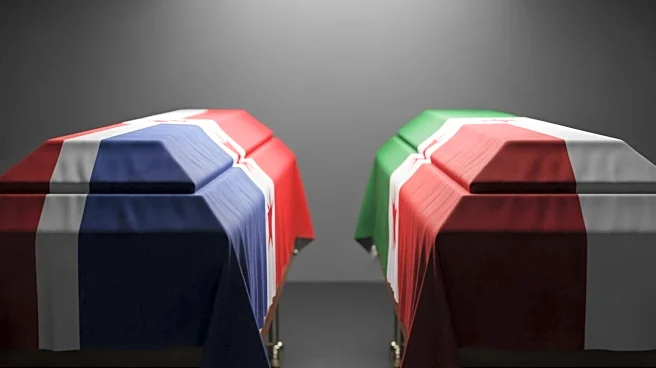What's Happening?
Israel announced that Hamas handed over two coffins containing the remains of deceased hostages from Gaza late Saturday. Prime Minister Benjamin Netanyahu increased pressure on Hamas to expedite the release
of the remaining hostages under the ceasefire agreement. The bodies were taken to Israel's National Institute of Forensic Medicine for identification. The ceasefire, aimed at ending two years of conflict, involves the exchange of hostages and prisoners. Hamas has handed over 12 of the 28 deceased hostages, citing devastation and Israeli military control as factors slowing the process. The Rafah crossing, Gaza's sole connection to the outside world, remains closed, affecting humanitarian access and movement.
Why It's Important?
The handover of hostages' remains is a significant step in the ceasefire process, which aims to bring an end to prolonged conflict and facilitate humanitarian aid. The closure of the Rafah crossing impacts the ability of Gazans to access medical treatment and travel, exacerbating the humanitarian situation. The ceasefire agreement is crucial for regional stability and has implications for international diplomacy, particularly involving Egypt and the United States. The situation affects thousands of Palestinians and poses challenges for peace negotiations and reconciliation efforts.
What's Next?
The Palestinian Embassy in Egypt announced plans to reopen the Rafah crossing for people returning to Gaza, although Israel's decision to keep it closed remains a point of contention. Continued negotiations between Israel and Hamas are expected to address the release of remaining hostages and compliance with ceasefire terms. International mediators may play a role in facilitating dialogue and ensuring the implementation of the agreement. The humanitarian situation in Gaza requires urgent attention, with increased aid and support needed to address the needs of displaced populations.
Beyond the Headlines
The ceasefire and hostage exchange raise ethical considerations regarding the treatment of prisoners and the responsibilities of conflicting parties in protecting civilians. The situation highlights the complexities of achieving peace in a region with longstanding political and territorial disputes. The role of international law and human rights organizations in monitoring and ensuring accountability is critical for sustainable peace efforts. The impact on regional dynamics and the involvement of external actors, such as Egypt and the United States, underscore the geopolitical significance of the ceasefire.









